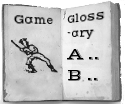Tut-Ball
| Game | Tut-Ball |
|---|---|
| Game Family | Kickball |
| Location | |
| Regions | Britain |
| Eras | Predecessor, 1800s |
| Invented | No |
| Tags | |
| Description | Also called Tut, this game was in 1777 called “a sort of stool ball much practiced about the Easter holidays,” according to the OED. OED identifies Tut-Ball with Stoolball and Rounders. [A] Gomme also cites a view that “This game is very nearly identical with ‘rounders.’” Another writer is known to say that Tut-Ball is the same as Pize-Ball. Gomme, however reports that balls were hit back with the palm of the hand, not a bat, at least in its earlier form. [B] Writing in 1905, Joseph Wright said: "Yorkshire: Now only played by boys, but half a century ago [1850's] by Adults on Ash Wednesday, believing that unless they did so they would fall sick in harvest time. This is a very ancient game, and was elsewhere called stool-ball. [West Yorkshire]. Shropshire: Tut-ball; as played at a young ladies school at Shiffnal fifty years ago. (See also 1850c.34). The players stood together in their 'den,'behind a line marked on the ground, all except one, who was 'out', and who stood at a distance and threw the ball to them. One of the players in the den then hit back the ball with the palm of the hand, and immediately ran to one of three brick-bats, called 'tuts' . . . . The player who was 'out' tried to catch the ball and to hit the runner with it while passing from one 'tut' to another. If she succeeded in doing so she took her place in the den and the other went 'out' in her stead. This game is nearly identical with rounders." |
| Sources | [A] Alice B. Gomme, The Traditional Games of England, Scotland, and Ireland (Davit Nutt, London, 1898), page 314. [B] Joseph Wright, The English Dialect Dictionary (Henry Frowd, London, 1905), page 277. Part or all of this entry appears to credit Burne's Folklore (1883) as its source. |
| Source Image | [[Image:|left|thumb]] |
| Comment | Gomme, writing in the 1890s, reports that tut-ball was played at Shiffnal, a school for young ladies around 1840. (The town of Shiffnal is northwest of Birmingham.) She also wrote that "A game of ball, now only played by boys, but a half century ago by adults on Ash Wednesday, believing that unless they did so they would fall sick in harvest time. This is a very ancient game, and was elsewhere called "Stool-ball' indulged in by the clergy as well as laity to avert misfortune." She cites other sources as noting the similarity of tut-ball and stool-ball. Query: One wonders whether some observers may have used “Tut-Ball” generically, to signify any game with “tuts,” or bases. Edit with form to add a comment |
| Query | Edit with form to add a query |
| Has Supplemental Text |
Comments
<comments voting="Plus" />
